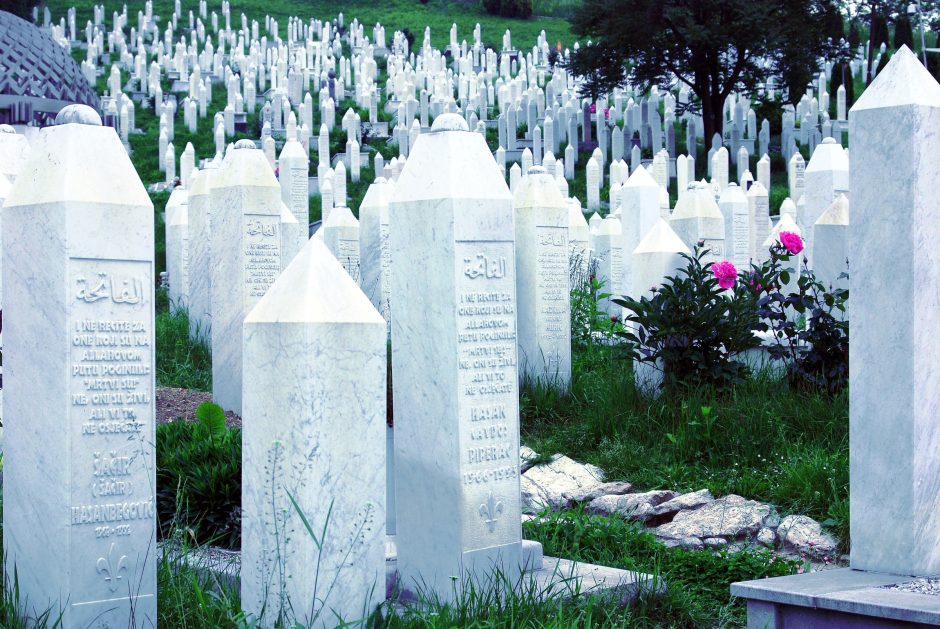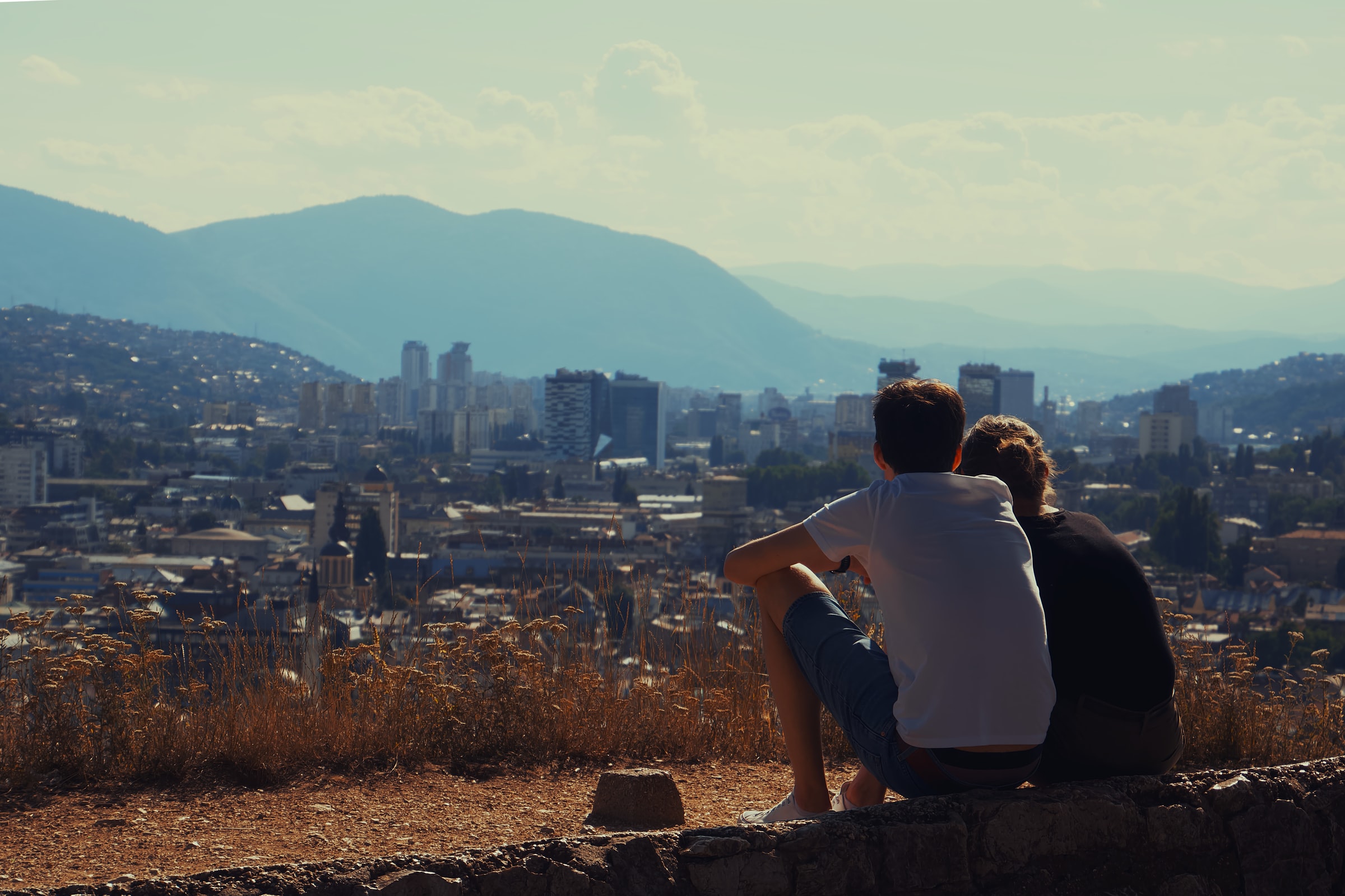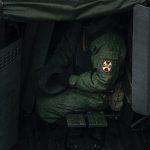Many uncertainties have during recent weeks and months swept through the Balkans. In Bosnia and Herzegovina, a new possibility of an upheaval of an old conflict might be on the horizon. With it, a threat of war and the resurfacing of an ethnic conflict buried a long time ago.
Bosnia is currently facing threats to the 1995 peace accords that put an end to a terrible war back in the 1990s. The peace accords from 1995 established a power-sharing mechanism among the three main ethnic groups in Bosnia: the Bosniaks, the Serbs, and the Croats. A Peace Agreement that is now under threat as genocide denial and nationalist sentiments take a deeper hold.
What is Happening Right Now in Bosnia?
Bosnia and Herzegovina is home to numerous ethnic groups. Among the three largest are Bosniaks (48.4 percent), Serbs (32.7 percent), and Croats (14.6 percent). The religious affiliations are also mixed; 50.7 percent identify themselves as Muslim, 30.7 percent as Orthodox, 15.2 percent as Roman Catholic, 2.3 percent as atheist, and 1.1 percent as other. These numbers show a state rich in terms of both ethnic affiliations and religions. However, under the surface or plurality lies several complex issues rooted deeply in the country’s history.
Currently, Milorad Dodik, the Serb member of the three-person presidential body governing the country, uses nationalist rhetoric and sentiments. Furthermore, Dodik is making political moves to secure more rights for the Serb-majority Republika Srpska entity within Bosnia. The politician aims to distance the Serb majority from Bosnian national institutions and instead create a parallel Serbian society. As an example, he mentioned the tax administration, the judiciary, the customs administration, and the intelligence service. Most controversial, both inside and outside of Bosnia, was Dodik mentioning that Republika Srpska wants to withdraw all of its Serbian soldiers from the national army to create its own defense force.
Tensions became clearer when Valentin Inzko, head of Bosnia’s Office of the High Representative (OHR), in July 2021 introduced changes to the country’s criminal code. The changes are related to genocide denial and glorification of war criminals; these charges can bring up to five years in prison. Both the International Court of Justice and the International criminal court for Former Yugoslavia declared the killing of around 8,000 Bosniaks by Bosnian Serbs during the Bosnian War as genocide. The decision was positively received by Bosniak politicians and the relatives of the victims murdered in Srebrenica. However, not the same can be said about the Bosnian Serb leader Dodik. He instead threatened to begin a process of dissolution of Bosnia, claiming that the Republika Srpska rejects the fact that the genocide took place and that this is something that Serbs must never accept.
But hostile rhetoric and genocide denial are not the only things Bosnia struggles with. The country also struggles economically – World Bank data from 2015 indicate that one out of every sixth citizen lives in poverty (16.9 percent).
As presented in the European Islamophobia Report from 2020, some indicators point to Islamophobic rhetoric by political figures and media being on the rise. The main causes of Islamophobia and conspiracy theories pushed by the Bosnian Serb politicians in media were the so-called “migrant crisis” in 2015 and onwards, which led to the portrayal of Bosnia as a haven for terrorists and as a failed state.
Other alarming aspects that add to the situation’s complexity are that the country is still far behind on trying to achieve EU standards and is still a fragile state. There are several aspects pointed out by the European Commission. Regarding political criteria, legislative and executive authorities had a low output due to political polarization and the pandemic. The country’s constitution is not in line with the European Convention on Human Rights (ECHR). Moreover, the country shows no progress in improving the electoral framework in accordance with European standards, or transparency regarding political party financing, and little progress in ensuring an enabling environment for civil society. The country’s judicial system functions poorly, which continues to undermine the citizens’ rights and the fight against corruption and organized crime in Bosnia and Herzegovina. Freedom of expression and media freedom is not guaranteed, especially in Republika Srpska’s entity; journalists have been experiencing intimidation and judicial prosecution.
The Response of the International Community
Michael Schmidt, the High Representative, wrote in a report delivered to the UN secretary general, António Guterres, that the actions of Milorad Dodik are a danger to the peace and stability of both Bosnia and the whole region. He also highlighted that if the international community did not react, this could lead to the undoing of the peace agreement adopted in 1995 (The Dayton Peace Agreement). Schmidt also warned that there could be conflicts between Bosnian national law enforcement agencies and Bosnian Serb police. Schmidt has the ability and power to remove Dodik from office if Dodik presents a clear threat to peace in the country.
Dodik does not consider the Office of the High Representative (OHR) a legitimate institution and continuously highlights that he has powerful friends on his side. The neighboring country of Serbia, along with China and Russia, also belong to those countries that see the existence of the OHR as an unlawful way for the EU and the US to assert their control in the region.
The Security Council agreed to extend the mandate of EUFOR-Althea, the European-led stabilization force in Bosnia and Herzegovina, for another year. The mandate is there to help implement the military aspects of the Dayton Peace Agreement. Council members and representatives broadly welcomed the resolution, but there were certain divisions, with a firm stand from the Russian side, on that there should be no references in that text to the role played by the OHR in implementing the civilian aspects of the Dayton Peace Agreement.
Considering the stronger nationalist rhetoric that Dodik is using, also the EU has expressed concern over the issue at hand. The Union strongly condemned the ongoing rhetoric and threatened to consider sanctions or bring changes into its regional assistance to Bosnia if the situation in the country were to become worse.
This is not the first time that the EU is dealing with Dodik. He began back in 2016 taking steps toward withdrawing Republika Srpska from Bosnia. That same year, Dodik started to vocally back an independence referendum for the entity, even though such an act was deemed illegal under the Dayton Accords. Even though the referendum question was eventually withdrawn by the politician, he decided to organize a separate referendum on the question of officially creating the Day of Republika Srpska. An astonishing majority of 99.8 percent voted in favor. The EU enlargement commissioner Olivér Várhelyi warned Bosnia’s leadership that if the current tensions get worse to threaten the proper functioning of the country’s institutions, Bosnia may lose significant investments coming from the EU. He warned the leaders that infrastructure investments could become a missed opportunity of around 1.5 billion euros.
But even within the EU block, there are divisions on this particular matter. The Hungarian Prime Minister Viktor Órban has supported Dodik and stated in December 2021 that it would become a security issue for Europe to integrate a state with two million Muslims into the EU. He also offered a 100 million euro aid package for Dodik and Republika Srpska while opposing any potential EU sanctions.
At the same time, the US Treasury announced sanctions towards Milorad Dodik with claims that he improperly used his position to make himself rich through a patronage system of bribery and graft. The aim of the sanctions, which were announced at the end of December 2021, is to report, freeze and block any assets that Dodik may have in the United States. Moreover, the US Treasury sanctioned Alternativna Televizija, a channel that the US says is owned by a company with close ties to Dodik’s family and is used to further his own political gains. Both US and German officials have threatened to impose more sanctions if Dodik continues to sabotage Bosnia’s already fragile central government and institutions.
The Bosnian War – A Brutal Past
To fully grasp the problems arising today in Bosnia, it is crucial to understand the history of the Balkan wars, which led former Yugoslavia to rupture into a number of new states. Yugoslavia was created after the German occupation in World War II and a civil war. The federation of six republics brought Serbs, Croats, Bosnian Muslims, Albanians, Slovenes, and other groups together under the leadership of a comparatively relaxed communist regime. Tensions, which were suppressed under the leadership of President Tito, re-emerged again in 1980 after Tito’s death.
The Balkans is the home to the largest population of European Muslims across several different countries. This is historically the result of 500 years of Ottoman rule that started around the 15th century. Most of the Muslim communities in the Balkans were once of Christian faith or pagan before the times of the Ottoman Empire. The Ottoman presence led to a moderate form of Islam mixed with previously existing cultures. In Yugoslavia, these changes led to war.
In 1991 calls for autonomy among nationalist groups in Yugoslavia led to declarations of independence in Croatia and Slovenia. A conflict broke out when the Yugoslav army, dominated mainly by Serbs, first in Slovenia and then Croatia. Thousands of people were killed in this struggle for independence, but the conflict was paused in 1992 under an UN-monitored ceasefire.
Bosnia was next to try for independence in 1992; the region included a mix of Serbs, Muslims, and Croats. However, Bosnia’s Serbs were against this independence, they along with the support from Serbs all over Yugoslavia, threatened to revolt if Bosnia’s muslims and Croats broke away. Even though Bosnia’s muslims and Croats outnumbered the Serbs and the European blessing for Bosnian independence in a 1992 referendum, war followed that same year.

For the first two years of the Bosnian War, the conflict involved three parties: the Bosnian government, the Bosnian Croats, and the Bosnian Serbs. The fighting between the Bosnian government and Bosnian Croat forces ended in March 1994, with the Washington Agreement and the Creation of the Muslim-Croat Federation. During the breakup of Yugoslavia, in the Bosnian War between 1992 and 1995, at least 100,000 people lost their lives. The population counted as many as 4.3 million during the war, of which 900,000 became refugees and another 1.3 million were internally displaced. The International Court of Justice and the United Nations war crimes court for the former Yugoslavia in the Hague ruled that the killing of 8,000 Bosniak men and boys in Srebrenica in 1995 by Bosnian Serb forces was genocide. Furthermore, families of at least 7,000 missing people have not managed to find their loved ones until this day.
What is next for Bosnia?
The country is clearly dealing with many issues and divisions among the numerous ethnic groups. Memories of a horrible and brutal past are still vivid in people’s minds and show the need for reconciliation, especially among Bosniaks and Bosnian Serbs. Genocide denial keeps these tensions alive by creating an even greater divide between the ethnic groups.
The US and the EU might want to push Bosnia into the direction of reconciliation and peace by using sanctions and perhaps even by removing Milorad Dodik from power if that becomes necessary. The more the US and the EU push for peace in Bosnia, the more space they give for Republika Srpska to seek help in countries such as Serbia, Russia, and China. And the sanctions might come to harm Dodik, but along with him, the rest of the country, which already now faces enormous political and economic challenges.
The question is, how long can peace be sustained in a country where pushes for change keep coming from the outside. To create a long-lasting peace, it is fundamental for Bosniaks, Bosnian Serbs and Croats to start communicating with each other, accept the country’s horrible past, and find a way forward.
The division on whether Republika Srpska should remain within Bosnia and Herzegovina polarized not only the country and its people, but has also caused a geopolitical struggle between East and West and divisions within the EU itself. Maybe sanctioning individuals instead of states is the way forward. Still, even without Dodik as a powerful political actor in the region, the nationalist sentiments on part of the Bosnian Serbs will not disappear on their own. Whether Bosnia will become part of the Western or Eastern sphere of influence and whether peace can be sustained in a country scarred by genocide and civil war is something only time will tell.

Magdalena Kamont
Master student of the "International Administration and Global Governance" programme at the University of Gothenburg. Currently writing her master thesis on democratic decline in Poland. Former intern at Sida.





